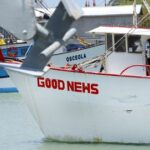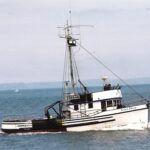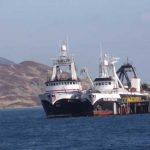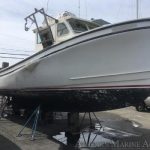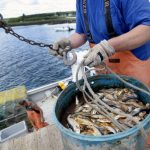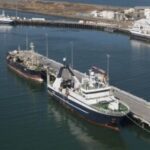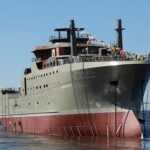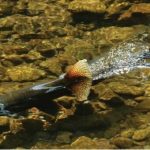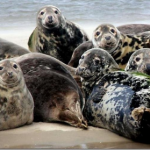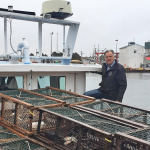Tag Archives: BC Salmon Farmers Association
Canada to ban open-net pen salmon farming in British Columbia
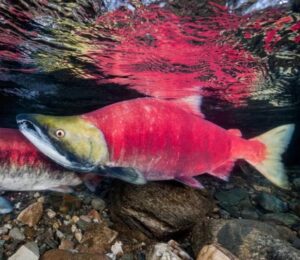 “Today, we are delivering on that promise and taking an important step in Canada’s path towards salmon and environmental conservation, sustainable aquaculture production, and clean technology,” said Jonathan Wilkinson, natural resources minister. There are dozens of the farms in British Columbia. More than half of wild salmon stock populations are declining in the province’s waters, according to the Pacific Salmon Foundation. Opinion polls have shown a majority of residents in British Columbia support ending open-net salmon farming, while more than 120 First Nations in the province have shown support for land-based closed containment fish farms. more, >>CLICK TO READ<< 09:27
“Today, we are delivering on that promise and taking an important step in Canada’s path towards salmon and environmental conservation, sustainable aquaculture production, and clean technology,” said Jonathan Wilkinson, natural resources minister. There are dozens of the farms in British Columbia. More than half of wild salmon stock populations are declining in the province’s waters, according to the Pacific Salmon Foundation. Opinion polls have shown a majority of residents in British Columbia support ending open-net salmon farming, while more than 120 First Nations in the province have shown support for land-based closed containment fish farms. more, >>CLICK TO READ<< 09:27
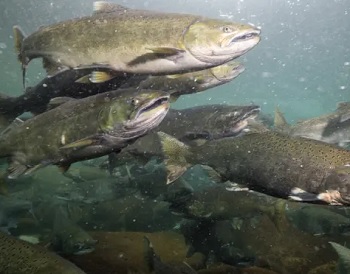
Canada ignored warnings of virus infecting farmed and wild salmon
Canada was warned in 2012 by its own scientists that a virus was infecting both farmed and wild salmon, but successive governments ignored the expert advice, saying for years that risks to salmon were low. Justin Trudeau’s government has said it will phase out open-pen industrial fish farms off the coast of British Columbia by 2025. But both his government and the previous Conservative government were in possession of a newly released report that linked large-scale farms and wild salmon to the highly contagious Piscine orthoreovirus (PRV). In 2012, biologists with the department of fisheries and oceans investigated the presence of the virus, which has been found in both farmed and wild salmon. but successive governments ignored the expert advice, saying for years that risks to salmon were low. >click to read< 11:48
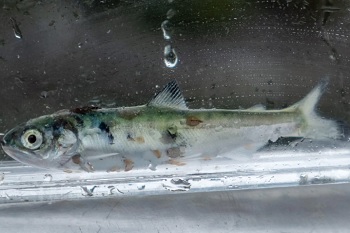
New Study – B.C. Salmon farms regularly under count sea lice, potentially putting wild salmon at risk
The study shows mandatory sea lice counts performed by the operators of the fish farms drop by between 15 and 50 per cent when they’re not being done during an audit by Fisheries and Oceans Canada (DFO). “That isn’t really a minor effect. This is a pretty obvious result,” said lead researcher Sean Godwin, who conducted the research for his PhD at Simon Fraser University. Salmon farms are required to perform monthly counts of the sea lice on their fish and make those numbers publicly available. The counts are self-reported, but fisheries officials perform occasional, pre-arranged audits to make sure the numbers are accurate. If the lice counts pass a certain threshold, the operators are required to pay for delousing treatments. >click to read< 15:59
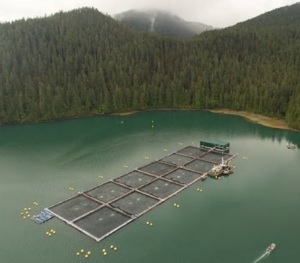
Fish farmers are upset by proposal by Canada’s ruling Liberal Party to ban all open net salmon farming in British Columbia by 2025.
The pledge, supported by various political groups in the province, has now been accepted as official future policy by the Liberals, led by Justin Trudeau, Canada’s controversial Prime Minister. Yesterday, the CAIA, together with its regional counterparts, including the BC Salmon Farmers Association and groups on the Atlantic coast, issued a statement rejecting the proposal. Timothy Kennedy, president and CEO of the CAIA, said: ‘The Liberal platform commitment to moving all salmon production in British Columbia to ‘closed containment by 2025’ is highly irresponsible,,, >click to read< 08:36
Liberal promise to end open-pen salmon farms in B.C. making waves on East Coast – >click to read< 10:23
Federal Liberals treat East Coast fishery as ‘second class’; move to ban at-sea fish farms off BC, but not eastern Canada? – >click to read< 16:01
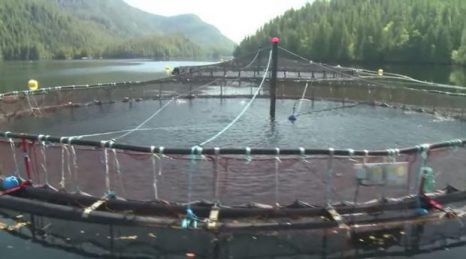
B.C. government looks into moving open-net fish farms onto land
British Columbia’s minister in charge of aquaculture tenures for the province is hinting at a major change in the provincial government’s approach to Atlantic salmon farming in Pacific waters. After the Washington State Senate passed a bill last Friday to phase out Atlantic salmon open-net fish farming in state waters by 2025, British Columbia’s First Nations hailed the move, raising hope the provincial government would do the same. >click to read<16:49
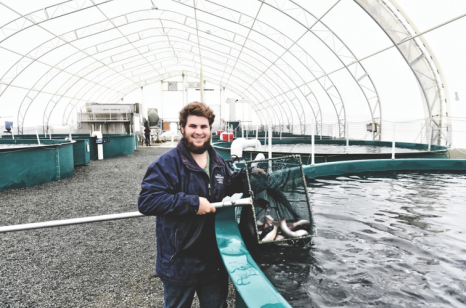
Land Based vs Open Pen Aquaculture – Fish out of ocean water dampen aquaculture enterprise
Some day, it might be possible to raise salmon in land-based closed containment ponds and make a profit. But that day is still a long way off, and even when it does become economically viable, land-based aquaculture might be like organic farming: an option for consumers willing to pay a premium, but which can’t replace ocean-based salmon farming. That’s not just the conclusion reached by the BC Salmon Farmers Association (BCSFA), it’s also the opinion of a Nanaimo businessman who owns a land-based fish farm. click here to read the story 12:39
Experts say BC salmon stocks not diminished by sea lice outbreak for now
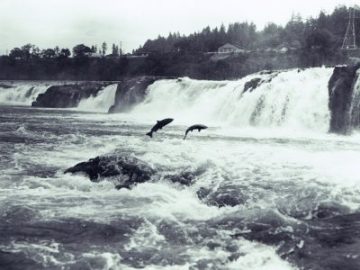 The price of salmon has shot up more than 15 per cent over the last three months, thanks to fish stocks being hit worldwide by an outbreak of sea lice. In Norway and Scotland, two of the world’s largest suppliers of salmon, sea lice outbreaks have made prices rise by a full 50 per cent, coupled with a huge algae bloom in Chile, the world’s second biggest producer of farmed salmon, and global production is down by nine per cent. But the market for Pacific salmon is not likely to see the same price spikes, according to Glen Spain of the Pacific Coast Federation of Fishermen’s Associations, who says that sea lice has so far been less of a scourge for Pacific Coast salmon. The tiny, naturally occurring parasite, found in both wild and farmed salmon, last proved to be a menace on the West Coast in 2015, when infestations were at their highest in five years. Read the story here 07:49
The price of salmon has shot up more than 15 per cent over the last three months, thanks to fish stocks being hit worldwide by an outbreak of sea lice. In Norway and Scotland, two of the world’s largest suppliers of salmon, sea lice outbreaks have made prices rise by a full 50 per cent, coupled with a huge algae bloom in Chile, the world’s second biggest producer of farmed salmon, and global production is down by nine per cent. But the market for Pacific salmon is not likely to see the same price spikes, according to Glen Spain of the Pacific Coast Federation of Fishermen’s Associations, who says that sea lice has so far been less of a scourge for Pacific Coast salmon. The tiny, naturally occurring parasite, found in both wild and farmed salmon, last proved to be a menace on the West Coast in 2015, when infestations were at their highest in five years. Read the story here 07:49
Piscine Reo-Virus found in salmon on one fish farm in B.C. but more research needed
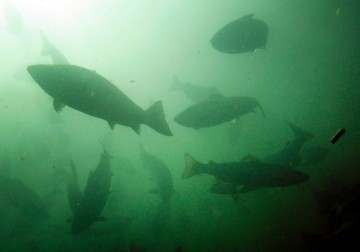 Scientists have detected a potential disease in farmed Atlantic salmon for the first time in British Columbia, but say more research is needed to determine if it could affect wild populations of the fish. Dr. Kristi Miller, head of the molecular genetics research program in the Department of Fisheries and Oceans, said pathologists found lesions on salmon on one farm in Johnstone Strait indicating they had heart and skeletal muscle inflammation. “These lesions were present for an extended period of time, at least eight months, on this (undisclosed) farm,” Miller said Friday. The Piscine Reo-Virus has been associated with all outbreaks of heart and skeletal muscle inflammation, as it was on the single B.C. farm, but it’s not known if it causes the disease, Miller said, adding scientists around the world are investigating how the virus could be linked to the disease. Read the rest here 19:36
Scientists have detected a potential disease in farmed Atlantic salmon for the first time in British Columbia, but say more research is needed to determine if it could affect wild populations of the fish. Dr. Kristi Miller, head of the molecular genetics research program in the Department of Fisheries and Oceans, said pathologists found lesions on salmon on one farm in Johnstone Strait indicating they had heart and skeletal muscle inflammation. “These lesions were present for an extended period of time, at least eight months, on this (undisclosed) farm,” Miller said Friday. The Piscine Reo-Virus has been associated with all outbreaks of heart and skeletal muscle inflammation, as it was on the single B.C. farm, but it’s not known if it causes the disease, Miller said, adding scientists around the world are investigating how the virus could be linked to the disease. Read the rest here 19:36

































